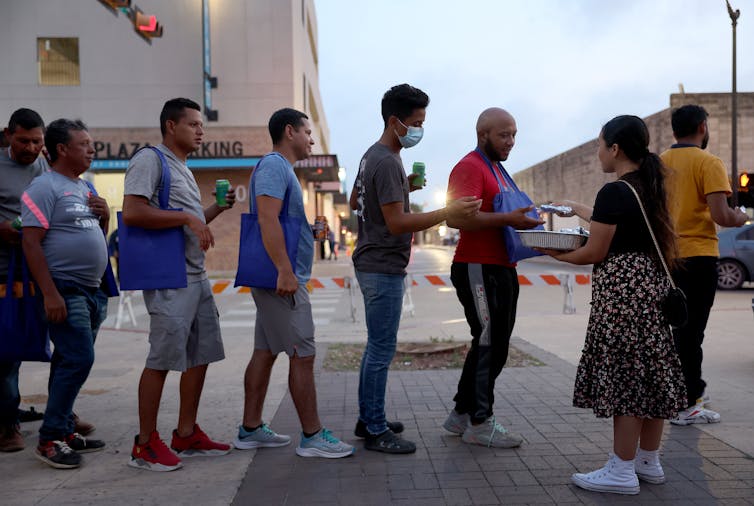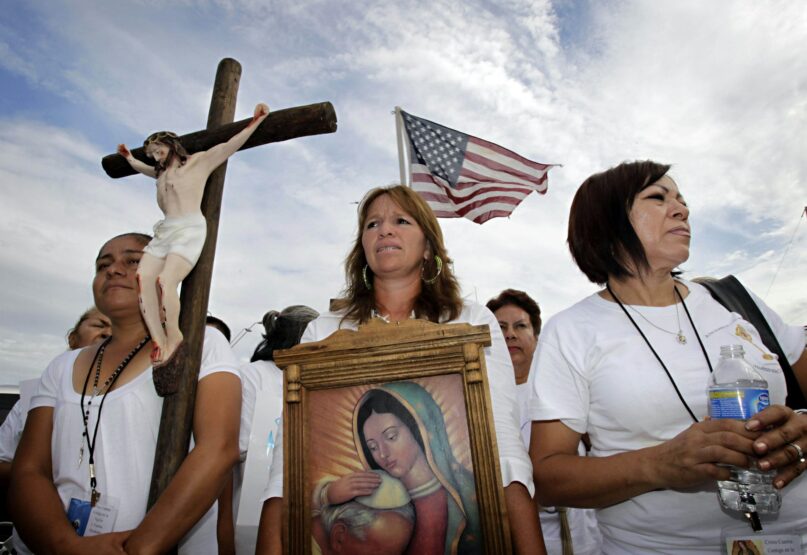(The Conversation) — A convoy of far-right Christian nationalists calling themselves “God’s Army” have been staging rallies on the southern U.S. border against migrants.
Under the banner “Take Our Border Back,” rally participants are using dehumanizing language about an “invasion” and citing the “great replacement” conspiracy theory, which claims that a cabal of Western elites and Jews are promoting migration in order to replace white people and their political power with nonwhite immigrants.
Several prominent figures in the Christian right have offered faith-based justifications for anti-immigrant rhetoric and policies. The Christian right has asserted the need to protect the American culture and families from the alleged dangerous influence of Islam and from the supposed wave of hardened criminals crossing the southern border. Indeed, opinion surveys consistently show that white Christians, especially evangelicals, are among the most likely groups in the U.S. to hold anti-immigrant sentiments.
Yet our work with faith-based, pro-immigration advocacy groups points toward a different reality. As we argue in our new book, co-authored with sociologist Nancy Wang Yuen, “God’s Resistance: Mobilizing Faith to Defend Immigrants,” faith leaders, including some evangelicals, are central to the current movement to protect immigrant rights, and they have been for over a hundred years.
Faith-based movements for immigrant rights
Historically, Latinx Christian leaders have been at the forefront of immigrant rights in the U.S.. For example, Mexican-American Catholic leaders of the Jim Crow era such as Alonso Perales and Cleofas Calleros applied Catholic social teaching, such as the inherent equality of all human beings, to civil rights struggles.
They founded leading organizations like the League of United Latin American Citizens and the National Catholic Welfare Conference, which played key roles in landmark civil rights cases, such as Mendez v. Westminster and Hernandez v. Texas.
Mendez v. Westminster ruled in 1947 that segregation of Mexican-American children in schools is unconstitutional, which paved the way for the 1954 historic Brown v. Board of Education anti-segregation ruling. Hernandez v. Texas ruled in 1954 that Mexican Americans and all other racial groups in the United States had equal protection under the 14th Amendment.
Many people also don’t realize the centrality of Christian spirituality in the immigrant-led farmworkers movement in the 1960s. Key labor leaders such as Cesar Chavez and Delores Huerta incorporated Catholic social teaching as well as religious symbols and practices in their successful unionization of farmworkers. For example, Chavez led a 25-day “peregrinación” – a pilgrimage – in California from Delano to Sacramento, under the banner of Our Lady of Guadalupe, a star of David, and a cross, which ended on Easter Sunday. This pilgrimage was a key turning point in the success of the movement.
In the 1980s, faith leaders in the U.S. and Central America joined together in the Sanctuary Movement to effectively challenge the Reagan administration’s asylum policies toward those fleeing the civil wars in central America. The movement ultimately led to changes in asylum law; those fleeing the wars were eventually allowed to apply for asylum. It also was partially responsible for the termination of U.S. military funding for wars in El Salvador and Guatemala.
Some of the largest and most influential immigrant rights organizations that exist today, like the Southern California-based Central American Resource Center, Coalition for Humane Immigrant Rights, and National Day Laborers Organizing Network, were founded by Latinx people of faith during this era.
Our book documents this history and also analyzes the key role of faith-based organizations in challenging the Trump administration’s crackdown in immigration enforcement, which led to record-high levels of immigrant detention and family separations.
We conducted case studies of six faith-based immigrant advocacy organizations in Southern California from 2018 to 2020, two of which are multi-faith, two evangelical, one Catholic and one mainline Protestant. We found that faith groups possess unique advantages, which when working in coordination with secular organizations, add significant power to the movement for immigrant rights.
Religious language about justice
Christian scriptures, symbols and rituals can vividly express ideals of the “Kingdom of God” or “Beloved Community” in which all people are equally valued and have the right to thrive and be safe from violence.
We saw how this religiously inspired vision can provide motivation, clarity, hope and endurance in the long and often discouraging task of mobilizing for social change. Religious or spiritual practices provide strength in particular to marginalized communities, which an emerging group of scholars is calling “spiritual capital.” Lindsay Perez-Huber, a professor of education and counseling, in her study of undocumented Chicana students, defines spiritual capital as “a set of resources and skills rooted in a spiritual connection to a reality greater than oneself.” In other words, religious beliefs and spirituality can be a source of resilience when people need to persevere and resist in the face of injustice.
In pleas to officials, and during speeches at trainings, rallies and protests, we consistently heard references to sacred scriptures. We heard the biblical command in the book of Leviticus that “the foreigner residing among you must be treated as your native-born.” Advocates passionately recounted the experience of Jesus’ family as refugees fleeing state violence to Egypt, and references to Jesus’ statement in the book of Matthew that “I was an immigrant and you welcomed me.”
We also saw religious rituals combined with nonviolent direct action in fasts and hunger strikes, prayer vigils and worship songs at Immigration and Customs Enforcement (ICE) facilities and offices, calling on the power of God to set the captives free. For these participants, they were not only engaging in an act of political protest, but personally connecting with God’s spirit for justice in the world.
Faith as a bridge across social groups

A church member hands out food to migrants on May 10, 2023, in Brownsville, Texas.
Joe Raedle/Getty Images
Our book also shows that faith-based groups bring immigrants into contact with non-immigrants, church attenders in contact with activists, and activists in contact with politicians who have faith commitments. These connections are crucial for building a broad movement for change.
Among the things we documented were church volunteers becoming personally connected to asylum seekers, detainees and their families as they helped provide access to housing, basic needs, jobs, transportation and legal support.
We witnessed faith leaders connecting undocumented young people with public officials who influence the policies that affect their lives, telling their personal stories to those decision-makers.
Faith leaders also had ongoing “ministerial” and “discipleship” relationships with fellow Christian believers who are ICE officials, members of congress, and city council members. These relationships influenced these officials at different times in key policy decisions.
In summary, our research shows that despite media attention to anti-immigration Christian groups, faith leaders and faith-based organizations have also played a central role in past and current movements for immigrant rights. Faith-rooted organizing has unique strengths that add significant power to movements for social change.
Rev. Dr. Alexia Salvatierra has received funding from the Louisville Institute to conduct this research. She is on the Board of Matthew 25/Mateo 25. She worked for CLUE from 2000-2011. Matthew 25/Mateo 25 and CLUE are organizations analyzed in the book.
Robert Chao Romero received funding from the Louisville Institute for this research.
(Brad Christerson, Professor of Sociology, Biola University. Alexia Salvatierra, Academic Dean, Centro Latino & Associate Professor of Mission and Global Transformation, Fuller Theological Seminary. Robert Chao Romero, Associate Professor of Chicana/o and Central American Studies, University of California, Los Angeles. The views expressed in this commentary do not necessarily reflect those of Religion News Service.)
![]()





